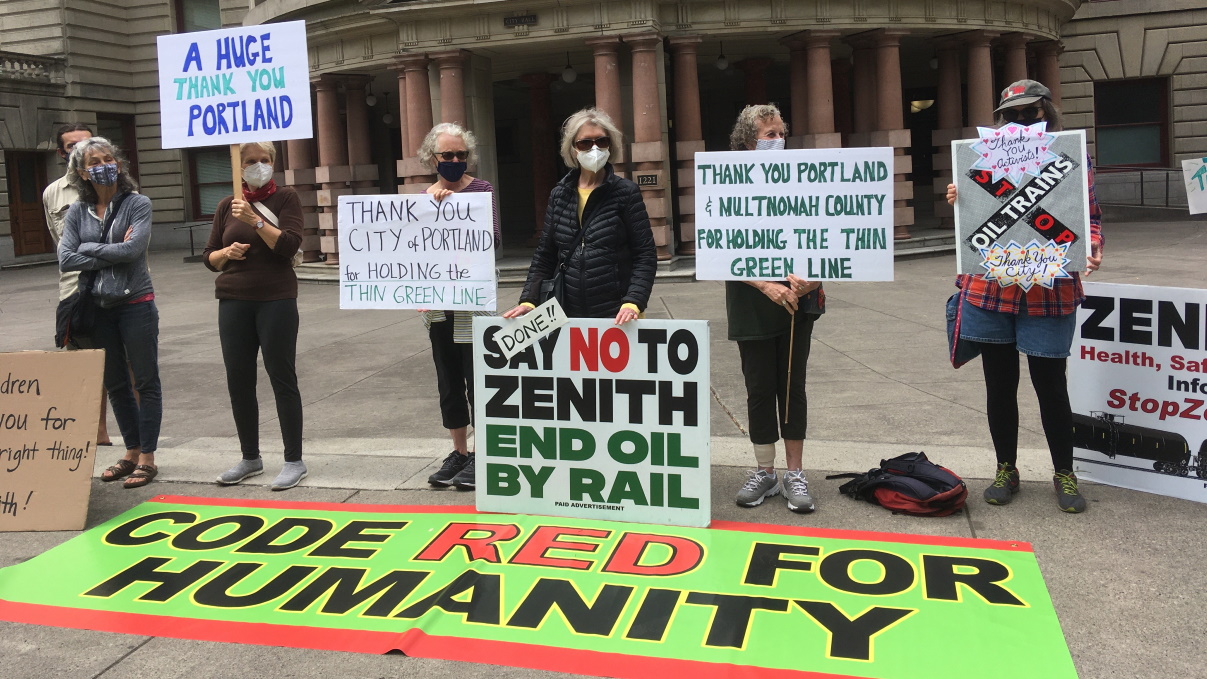The Land Use Board of Appeals has not yet ruled on Zenith, but we expect a ruling at any time. Currently, Zenith has appealed the City of Portland’s decision to refuse a land use compatibility statement for Zenith’s continued processing of dangerous tar sands oil at its facility on NW Front Ave. Portland’s Bureau of Development services made that decision at the end of August 2021. The Department of Environmental Quality subsequently denied the air quality permit Zenith energy needs to operate legally. On October 27, Zenith filed its appeal with the Land Use Board.
We are ready to take action quickly when the Land Use Board makes its ruling. If they rule in favor of the City and deny Zenith’s appeal, we will be out at Zenith supporting the decision and letting Zenith know that Portland citizens want Zenith out. If the ruling is in favor of Zenith, we will show up at Zenith’s lawyers’ office in downtown Portland. Stoel Rives law firm claims to be “green.” We will let the public know that they continue to work for Zenith.
If you haven’t been following the Zenith story, here’s some background. Zenith Energy Terminal is in Portland’s Critical Energy Hub which stores 90% of the region’s fossil fuel. It is one of 11 facilities in the CEI, and is the only one with rail access—the only destination in our state for oil by rail.
The facility was an asphalt facility from 1957 to 2005, then changed hands. In 2014, Arc Logistics bought the plant and started bringing in oil trains with cars full of waxy crude oil from Utah. There was public outcry at the time. Arc Logistics applied for several construction permits to expand the terminal’s rail unloading capacity. They did not bring many trains in between 2015 and 2017. In December 2017, Arc Logistics sold the facility to Houston-based Zenith Energy Management.
Immediately, Zenith began bringing in tar sands oil trains and exporting the oil by tanker to refineries in the SF Bay Area. In late 2018, observers noticed an uptick in train shipments. In early 2019, construction cranes were seen at Zenith. In early February 2019, the story broke that Zenith was expanding its oil train processing capability from 12 cars at a time to 44 cars.
The climate justice movement mobilized to stop Zenith. The City had passed two resolutions in 2015, one mandating no new fossil fuel infrastructure and the other opposing oil by rail terminals. Zenith was able to expand because the construction permits they were using were grandfathered—they had been granted to their predecessor before the City policies were passed. Climate activists called, wrote letters, met with city officials, demonstrated at City Council hearings, organized forums and generated a lot of pressure. The City told activists that they did not like Zenith’s expansion, but there was nothing the City could legally do to stop the construction.
Extinction Rebellion activists built a garden on the rail yard at Zenith and blocked the processing of oil trains for 27 hours on April 21, 2019. We went back and rebuilt the garden a week later. In early 2020, 5 XRPDX activists pled not guilty, using the Necessity Defense, during a criminal prosecution for criminal trespass. Five out of six Multnomah County jurors voted to acquit the defendants [including the author – Ed.], ending in a hung jury. The Multnomah County District Attorney’s office decided not to retry the case.
Zenith subsequently built a wall around the facility and continued their expansion of their processing capacity.
Activists continued to put pressure on the City around Zenith’s continued operation. XRPDX and many other groups held forums, wrote letters, called the Mayor and City Councilmembers, especially Dan Ryan, and demonstrated through 2020 and 2021. As it became clear that the City could deny Zenith the Land Use Compatibility Statement (LUCS) that it needed to renew an air quality permit, the pressure escalated. Every month another seasonal action with post cards, letters and calls generated floods of contact with City officials demanding that the City deny Zenith the LUCS. On August 27, we won that battle when the Bureau of Development Services did what we asked and denied the LUCS.
Zenith continues to operate while it waits for the ruling from the Land Use Board of Appeals. We will continue to tell Zenith they are not welcome here and their operation is not compatible with a sustainable future.
(Photo credit: Tri Sanger)

